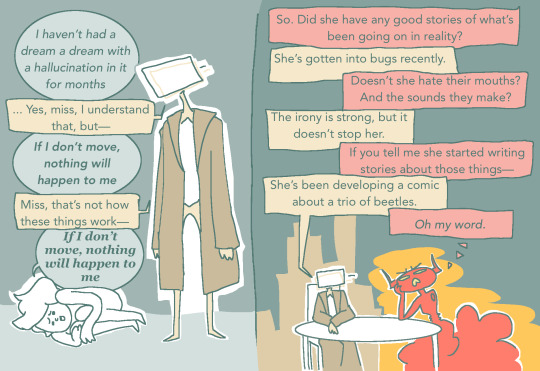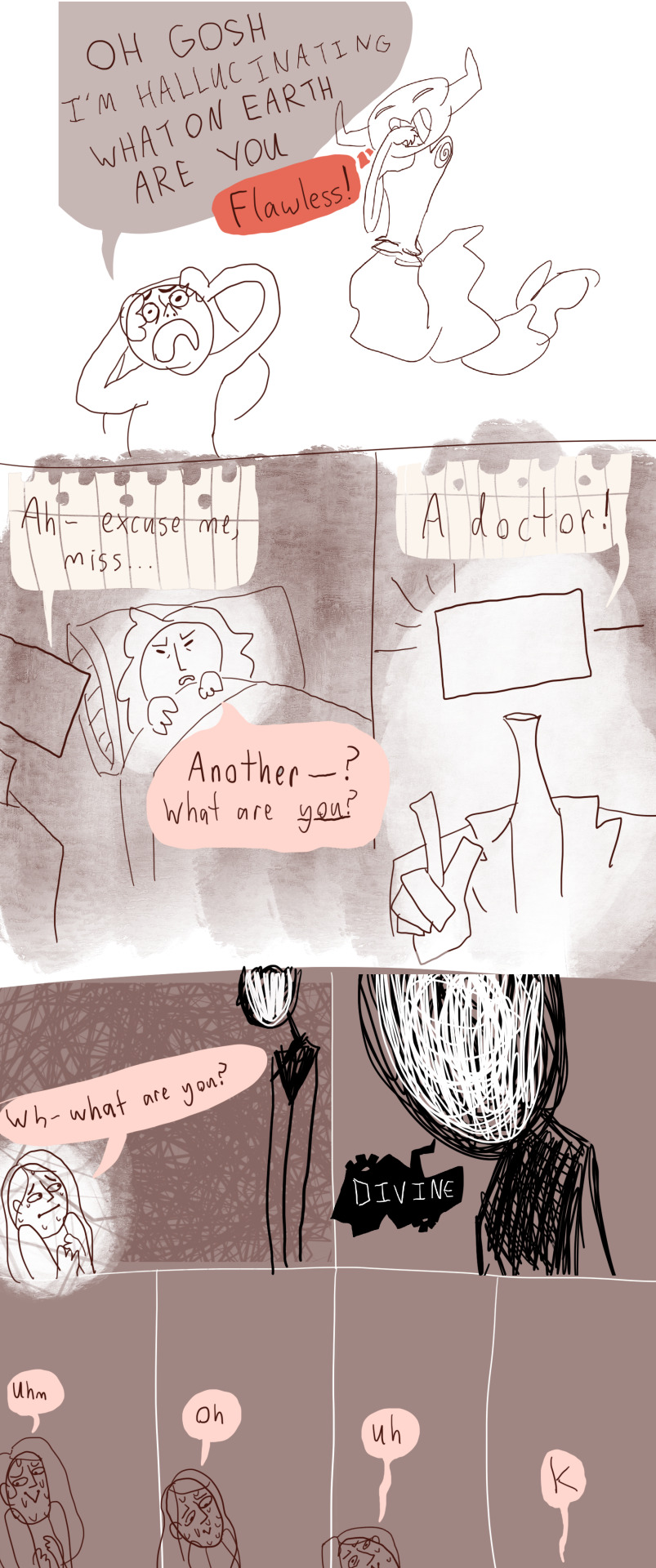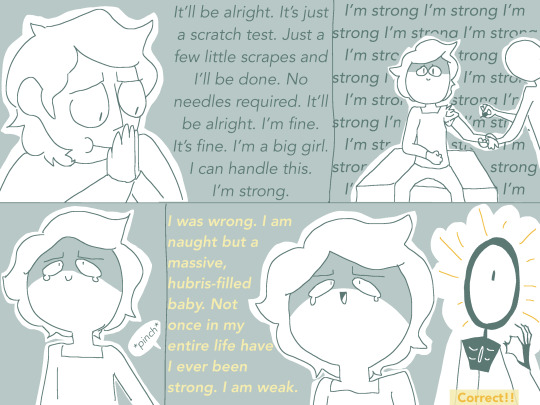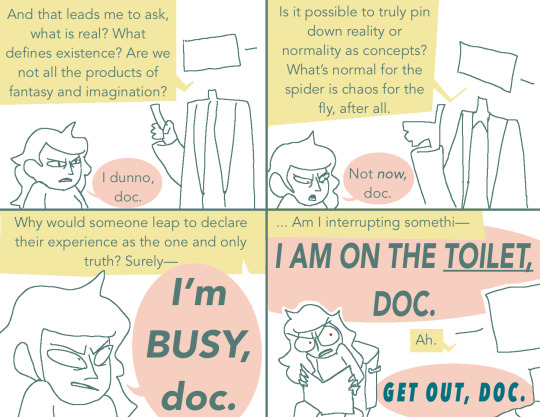#Language learning journey
Explore tagged Tumblr posts
Text
What I learned in German Today
Here's what I learned today as someone who is a B2-C1 learner (Mostly learning C1-C2 content at this point)
( I did lots of Anki, went to school today so naturally had quite a bit of engagement with the language today, and read One Piece Chapter 1 in German as well Flying Witch Chapter 40 in German. Then I made flashcards for the vocabulary I learned. Here are some of the words and expressions!
den Geist aufgeben (To give up the ghost/spirit) — To give out/Malfunction...oftentimes used for technology or machines that stop working.
In Verruf bringen (To bring into disreputability) — To give a bad name to...essentially to make someone look bad. Another way to say this is to use the verb "anschwärzen" which literally means to "darken/blacken"
Verwelken — To wilt/wither/shrivel up...this is typically used to describe the behavior of plants
Flink — Agile/Quick/Nimble
Zermahlen — Pulverise/Crush/Grind up...This word is used to describe the action oftentimes in regards to food to fulfil certain recipes
Einstufen — To categorize/categorize as/classify as
Unversehrt — Intact/Undamaged
auf etwas pfeifen (to whistle on something) — To not care about/To not give a damn about
auf der Stelle (on the place) — On the spot/Immediately/Right away/Extemporaneously
die Teilzeitkraft — Part-time employee
die Alraune — Mandrake...yes the plant
Umherhuschen — To scurry about
Streuen — To disperse/sprinkle/scatter Collapse
Austoben — To let of steam/Let loose/Run wild...think of it as challenging someone to a fight but you want to act nonchalant. This word is perfect for such a situation
Putzig — Cute/Endearing/Amusing/Charming
Hinterhältig — Deceitful/Doesn't play by the rules/Devious
Auf's Spiel setzen (To set on the game) — To risk something...for example "Er setzt sein Leben auf's Spiel" (He's putting his life at risk)
That's all for today! Lots of words that aren't so oftenly used but nevertheless are important if you want to read lots of literature.
21 notes
·
View notes
Text
✨ How I Choose Which Language to Learn 🌍 Before diving into any new language, I always start with what I call the Research Phase. Breaking down the who, what, where, and why before the how. Learning a language is personal, and not every popular choice is the right fit. This post explores how I figure out which language to learn. 📚 #languagelearningtips #howtolearnalanguage #polyglotjourney #languagefluencygoals #learnlanguages
#becoming a polyglot#Goals#how to choose a language to learn#language learning#language learning for beginners language research phase tips#language learning journey#Tips#Why I want to be a polyglot by 30#langauge learning#learning#learning french#learning mandarin#learning chinese
1 note
·
View note
Text
language learning culture is always watching children’s media in various languages
#benkyou posting#polyglot#langblr#studyblr#language learning#studying#studyinspo#i never watched toooo much childrens shows in japanese but right now my main mandarin study resource is a website made for kids to learn#one of the more advanced stories on the website is a kids version of journey to the west#im so excited to be able to watch that one some day#i do need to start reading (comics) though because im mostly just watching things as immersion in mandarin
493 notes
·
View notes
Text
i know a lot of people like to make fun of young queer people who use a bunch of microlabels and engage in niche or "cringe" aesthetics but im gonna be so honest, i love them so much. i 100% was that kid and while now i don't really use or think about any of the labels i used back then, that doesn't make that time any less valuable and valid (and it doesn't make someone less valid if they do keep using that terminology into their adult life!). queer kids who are figuring themselves out and are learning about new fun words for genders and pronouns and sexualities deserve to run wild and be loud and happy and not carry and be impacted by the shame that many of us have been taught to hold.
my cousin is a year younger than how old i was when i first realized i was queer and they've vaguely known they were queer for a couple years now. personally, i think that's pretty awesome. recently they've gotten into the very stereotypical scene kid aesthetic and i make a point to compliment them on it every time i see them. almost every time i see them they have a new adjustment as to how they view their gender/sexuality and i always tell them that that's really cool and i give them a hug. recently they told me they have a boyfriend and listed like 3 separate labels as to how he defines his gender and i asked them if i was remembering the definitions of all those words correctly (which i was because, like i said, i was that kid lol).
it's just all these small things that seem so trivial or "weird/cringe" that so many people look down on queer kids for engaging in and i'll never understand it. i think it is so unbelievably cool that these people are figuring themselves out and finding new terms and identities and things that they can be and they're just so excited by it. being excited by queerness is cool! wanting to engage in niche subcultures is cool! allowing yourself to be who you are in that moment without the worrying guilt of having to get it "right" is wonderful and awesome and cool and how it should be!! please do not teach the queer kids to be ashamed of themselves in a time where they should be able to run wild and figure out their identities in a way that truly makes them happy!!!!
#sorry for rambling but this is something im genuinely very passionate about#theres this idea of “oh theyll grow out of it”#okay and??#something something “show me a permanent state of self”#and even more infuriating is the idea of “they make the queer community look bad by having all these microlabels!!”#or “those labels/sexualities/genders arent real!"#fun fact buddy#gender and sexuality and even LANGUAGE#ISNT REAL#NONE OF ITS REAL#ITS ALL SOCIALLY CONSTRUCTED FICTIONAL CONCEPTS#IT MAKES NO SENSE TO WANT OTHER PEOPLE TO PLAY BY THESE FICTIONAL RULES YOU MADE UP FOR THESE FICTIONAL CONCEPTS#also cishet people aren't gonna respect you any more as a queer person just because you're one of the “normal” ones#and if they do. boy oh boy i have news for you.#they never respected you and your queerness in the first place#the purpose of queerness is not and never has been to be palatable#it is about being yourself and self expression and radical acceptance of the full range of human gender and sexuality#it is about finding joy in the very thing that people deem you an outcast for being#will these kids likely “grow out of it”? yes but that doesnt make their experiences any less real and true and valuable#imo queer kids exhibit one of the most true forms of queerness which is self-discovery#the way they radically embrace this thing about themselves they are largely taught to feel shame for is beautiful and commendable#we should honestly all be learning from them#and also supporting them!! this is a very crazy stage of life! let queer kids in your life know you love and support them!!#in every stage of their journey!!!#sorry ive been having a very rambly day today#but i just think about this every time i see my cousin#and i see myself in them and i know how awful i felt bc i had no one who cared/supported me in that#and i just want to make sure they have at least one person#who they know thinks theyre cool as fuck and is on their side 100%#also my cousin thinks im cool! which is crazy!! and i wouldve gone WILD if i knew that someone i thought was cool that *I* was cool!!!
17 notes
·
View notes
Text
Future me will be so proud of me for staying consistent.
#healthy girl#college girl#language learning#hobbies#health is wealth#fitblr#black girl fitness#fit black women#gym babe#weight loss#college aesthetic#school aesthetic#school life#gym life#study aesthetic#studyblr#study motivation#gym motivation#desiredivine#dream girl#dream life#level up journey#high maintenance#leveling up#glow up challenge#glow up#soft life#becoming that girl#it girl#it girl aesthetic
78 notes
·
View notes
Text
rereading soft launch and it's funny how i gave up halfway through on the whole kansai-ben for osamu
#i don't think it's a hot take (or any take at all even) but imo you don't need to give the twins a southern accent to try imitate theirs#and it's not a bad thing either if you do. i really just enjoy any variation of this while reading. write whatever and however you want#just in terms of writing it myself it's such a struggle since english isn't my 1st language and accents don't come natural to me#like i can barely grasp them in my own language lmao i won't even try to make it sound natural in english#when it's not even natural in english either because there's so many nuances in translation and some things just will get lost#if anything i always imagined them as cowboys. just one ya yer yeehaw away from it all#anyway. looking back i guess this is the one thing i'd fix but also i kinda like it this way. charming somehow#it shows what a journey and learning curve writing this has been for me (still is!) so it's fine#-`♡´- tulip mail
15 notes
·
View notes
Text






If you’ve ever dramatically underestimated how much time and energy it takes to learn a new language — especially one with a whole new alphabet and structure — you’re not alone.
Hebrew isn’t just “another language”.
It’s layered, meaningful, ancient, vibrant… and sometimes, completely confusing.
It’s not just the words.
It’s knowing its patterns and templates.
It’s understanding how to actually use them.
It’s second-guessing everything because no two sources say the same thing.
It’s wondering if you’re making progress — or just collecting random vocabulary.
And it’s exhausting trying to piece it all together on your own.
If these scenarios felt a little too real… you're in good company.
👇 Tell me which one hit hardest. I promise, you're not the only one 💙
10 notes
·
View notes
Text
*skitters up to you on all fours with a bunch of drawings in my mouth* *drops them at your feet* *skitters away*
enjoy some schizophrenia / psychosis / mental health-based humor.





#had an exchange with someone very important to me that helped me work up the moxie necessary to get over my anxiety and post some of these#(you know who you are and i know you're reading this. ilusm and thank you for being in my life)#I'll schedule this post for later in the day. 100% I'm going to forget about doing that and be confused when I start getting notes for it#anyhoo#I wonder if I can rescue the mental health + journal comics I posted to Instagram and repost them here...#I mention my mental health journey fairly often on here but I feel I should clarify:#IF YOU HAVE QUESTIONS ABOUT SCHIZOPHRENIA / PSYCHOSIS / WHATEVER--- GO FOR IT! ASK ME THEM!#I won't be offended by genuine questions even if they're phrased a bit awkwardly or use language that might be less than perfect!#If you want to learn about stuff I will gladly describe my experience to the best of my ability! I don't mind whatsoever :>#not sure if that needed to be said or not but I figured I should say it just in case since I'm making a big ol' post that cracks jokes#I'm significantly removed from actively hallucinating and have made leaps and bounds in my emotional health so I'm in a great place now#mental health#mental health comic#mental illness#mental health humor#psychosis#schizophrenia#psychosis memes#schizophrenia art#humor#diary comic#diary comics#journal comic#journal comics#stuff by sofie
41 notes
·
View notes
Text
For anyone looking to learn Vietnamese, here is what I personally use:
🇻🇳
Apps
* Duolingo (yes, I said it. It's a good foundation.) Free -includes premium
* Drops (use topics that correlate with what you are already learning, good for retaining memory. Like flashcards but fun.) Free -includes premium
* Learn Vietnamese Speak, Listen (yes, that is the name of the app 😭. Really good for speaking/listening especially if you don't have anyone to practice with. Learn content that correlates with your Duo/Drops lessons.) Free -includes premium
Books
* Lonely Planet Vietnamese Dictionary (self explanatory, good for reference. Any dictionary works.) $$$ pricey / may be found in public library ✅
* Reading and Writing Vietnamese: A Workbook for Self-Study (found on Amazon here, covers basically everything needed for beginners) $$$ pricey
YouTube
* Tieng Viet Oi- Vietnamese Lessons (here)
* What the Pho (here)
* Vietglish Fun (here)
* Learn Vietnamese with Annie (here)
* Learn Vietnamese With SVFF (Southern Vietnamese. here)
Individual Video Recs:
*The Vietnamese Alphabet
*Vowel Pronunciation
* Vietnamese Tones
* Counting 1-10
* Travel Basics
* Accent Discrimination
Hope this helps. Vietnamese is hard, but I believe in you!!! 🇻🇳💖
Q: What helps you learn? Let me know!!
#language learning community#learn vietnamese#vietnamese learning#polyglot#studyblr#study#study blog#vietnam#tiếng việt#progress#beginner language learner#langblr#language journey#for beginners
38 notes
·
View notes
Video
youtube
Learn Japanese with Anime - The Person Standing Before You Is A Mage Who...
#youtube#learn japanese#japanese study#japanese studyblr#japanese language#japanese langblr#日本語#にほんご#日本語の勉強#日本語勉強#nihongo#japanese vocabulary#japanese grammar#anime#japanese anime#anime quotes#アニメ名言#frieren: beyond journey's end#sousou no frieren#frieren#aura#葬送のフリーレン#フリーレン#アウラ
22 notes
·
View notes
Text
I use German audio books for most of my ear training. Most of the ones available for free are translations of classic novels that I've known about forever but never read. Anyway I'm getting an accidental education in classic literature, except there are still certain words I don't understand so I just have alternate contextual interpretations of a bunch of random classic novels.
#german#Deutsch#language learning#I'm really enjoying my incorrect interpretation of Jules Verne's Journey to the Center of the Earth
43 notes
·
View notes
Text
Everyone has a different approach with astrology and it’s all valid.
The sheer diversity in the ways it can be used makes it more beautiful. Some people are more focused on the future, while some people are more focused on the present or past. Some people want to get deep into self, others and/or relationships, while some want to get deep into society and world events. Some approach it in more practical ways, with an aim to plan around it, while some approach it in more spiritual ways, with reverence and gratitude for the planets that shed light on the spiritual journey. Some don’t even want to learn much beyond the signs, but that is so valid too because I have known people like this who have said things that demonstrate a very on point intuitive understanding about the signs.
I’ve learned to appreciate that astrology is a universal language, that can be applied to anything, and people use this language in the ways that speak to them. I no longer pressure anyone to go down any avenue with astrology that doesn’t excite them, because following your excitement is key to this study in my opinion.
#astrology blog#astrology#learn astrology#astro notes#spirituality#astro tumblr#spiritual journey#zodiac signs#astrology tumblr#astrology observations#natal astrology#synastry#transits#mundane astrology#electional astrology#astroblr#philosophy#astrology community#the universe#languages#zodiac
35 notes
·
View notes
Text
new studyblr alert! 🤭
@giornogezellig
that is all.
3 notes
·
View notes
Text
A Bookshelf in Three Languages

Language was just difference. A thousand different ways of seeing, of moving through the world. No; a thousand worlds within one. And translation — a necessary endeavour, however futile, to move between them. Babel by RF. Kuang
There are three languages on my bookshelves: English, French, and Urdu. Each of them holds a part of me and says something about who I am. Some are easy to read. Some are still a struggle.
Urdu is the language of the place I was born.
From the streets of Old Delhi, it speaks of masjids, food stalls, a mixed culture, and the religious diversity of Shahjahanabad. When my parents moved to Europe, they both wanted me to keep my mother tongue. They always spoke to me in a mix of Hindi and Urdu. It's the language of home, of warmth and familiarity. The one I use with my family, the one that plays in the background of old ghazals, the one that colored my childhood through dramas and films. It’s a language woven from the cultural tapestry of the subcontinent, and every word feels like poetry.
But in recent years, with the rise of Hindutva in India, I’ve watched with a heavy heart as my motherland is torn apart by religious and fascist ideologies. I’ve also seen the language I grew up with—one of my deepest ties to the land where I was born—turned into a political object. Urdu became “the Muslim language.” And Muslims like me, in this political narrative, apparently no longer belonged to India.
It made my heart ache. What about our ghazals? What about the beauty of this blended language? What about the stories whispered in homes and sung on radios? What about the schoolbooks we read, the handwritten letters, the film scripts that shaped generations? What about the political essays written in Urdu by intellectuals during the independence movement?
That rejection only made me hold on to Urdu more fiercely.
In 2021, I decided to learn how to read it. I felt the need to protect my heritage in a more active way. I started online classes on Preply with a lovely Pakistani teacher, and after a year, I was able to read simple children’s books. Now, my goal is to read a full adult novel but honestly, it’s tough. I struggle with pacing and often lose focus. Still, I don’t want to give up.
Lately, I’ve been thinking about trying immersive reading—pairing books with audiobooks to help build fluency. It’s slow progress, but it’s something deeply dear to my heart.
French is the language that first said the word “immigrant” to me.
But it’s also the language I read my first story in.
When my parents moved to Belgium, I was schooled in French. It became the language I learned to read in—and the one I used to write my first stories, fanfictions, essays, and novellas.
It’s still the language I feel most at ease with—both for reading and writing. I can read quickly, without losing nuance or depth. When I want to tackle long or flowery books, I often choose the French translation—like I did for The Priory of the Orange Tree or The Realm of the Elderlings. I also enjoy reading essays on French and Belgian politics.
Too often, the books I’m drawn to are either untranslated, badly translated, or left unfinished. And the French publishing world? It’s not very diverse—often even less so than the English one.
That’s what eventually led me to my third language.
English is the language of my colonisers.
It’s also the language that opened me up to more diverse stories. Ironically, it’s in English that I first read Indian authors. It was the language my parents switched to when they didn’t want us to understand what they were saying.
I strengthened my English through school, the internet, and my English-speaking friends. I started reading novels around the age of 19, mostly YA at first, and now I read comfortably.
Sometimes I still need more focus—especially with poetic or dense writing—and when I’m stressed, I definitely read slower than in French.
But I love reading in English, not because I want more American books, but because it gives me access to stories from around the world, including India. It brings more diversity into my favourite genres: fantasy and historical fiction.
Still, it’s not a perfect language. It’s one that colonised—and in many cases, erased—others. It tried to erase mine.
So I’ll always approach English with some caution. It isn’t mine. But it’s a tool I’ve come to love using.
As a child, I dreamed of becoming a writer.
I used to invent stories and write them in WordPad—novellas, short stories, fanfictions. I dreamt of publishing a novel that would offer readers the kind of adventure books gave me.
But I haven’t written fiction in twelve years. Most of my writing since then has been essays, especially through my antiracist work. And yet, a part of me still dreams of telling stories.
Sometimes I wonder: if I were to write stories again, in which language would I want to do it?
I’d love to write beautifully in Urdu but I’m not there yet. Speaking and writing are two very different things. English would probably be my first choice, because I prefer the publishing world in that language. But since it’s not my native tongue, it’s hard to craft something fluid and beautiful without heavy revisions. I write more naturally, more lyrically, in French. But the publishing world there feels so white, so elitist—it really discourages me.
Still, I know it’s a privileged dilemma to have. I feel deeply grateful for these three languages. Each one tells a different part of my story.
So that’s how I ended up with a bookshelf in three languages.
To Urdu, my heart belongs and my roots speak. To French, it’s my comfort zone, the language I was raised in. To English, the language that opened me up to the world.
#multilingual#diaspora thoughts#urdu language#english language#books and identity#language and memory#immigrant stories#reading journey#writing journey#colonialism#minority voices#south asian diaspora#tumblr essay#language learning#desi me#desitblr#books#bookworm#booklr
2 notes
·
View notes
Note
Hello, Magister Kafka. What's your favourite flower?
Magister Kafka: Ahh... This question is quite... Refreshing...
(he whispers and covers his mouth)
Magister Kafka: My favourite flower is... Lavender...
(he answers softly and gives a gentle smile to anon)
Magister Evangeline: MY FAV IS HIBISCUS-- THAT RED ONE! and Also-- RED SPIDER LILY!
(she chuckles and grins in satisfaction)
Magister Kafka: Miss Eva, aren't they... (he pauses and looks away) Nevermind...
Magister Evangeline: It's JUST flowers. What's more DEEPER about them?
(she raises an eyebrow and looks at him)
Magister Kafka: Nevermind... Miss Eva... They're, indeed... a strong colour in my eyes... So, yes... It suits you...
(he says softly and she grins at his remarks)
#afk journey#afkj#afkj merlin#afk journey merlin#afk merlin#afk journey oc#me n my merlin in the mystical house#ask magister kafka !#They just answering light questions#no need to be too deep in the ask#their minds often short circuit if the question is too... complex...#Magister Kafka likes to learn more about the flower language so...yeah...#I imagined that one day... there's a Mauler region revolves around tropical region... i hope that's happen in the future...#Magister Kafka finally gain a strength to answer question ! yeayyy
3 notes
·
View notes
Text
i’d like to get back into language learning, but the problem is that i know enough french that it automatically becomes the one i’m interested in learning more about because imagine if i could get closer to fluency!!
but spanish is the language that would make waaaay more sense for me to learn where i live and actually be potentially useful in day to day life. i remember a bit from high school, but that patchwork memory makes finding a new starting point weird, and the vast amount of dialects for spanish, even if i focus on ones specific to my area, make it even more confusing to maintain a direction.
in short, my motivation is too low for spanish. “useful” doesn’t make it “exciting.” :T how do i fix that.
#also learning from native speakers rather than in school is….very different#all the different accents of different regions and pronunciations get confusing#idk i cant get into it in the same way#but id really like to change that#should i just focus on spain spanish until im further in???#but mexican spanish sounds less annoying tbh#i didnt hear a quebequoise accent until pretty far into my french journey#the urn deur trois took me OUT i was like where did these r’s come from???#language#life#rant
5 notes
·
View notes